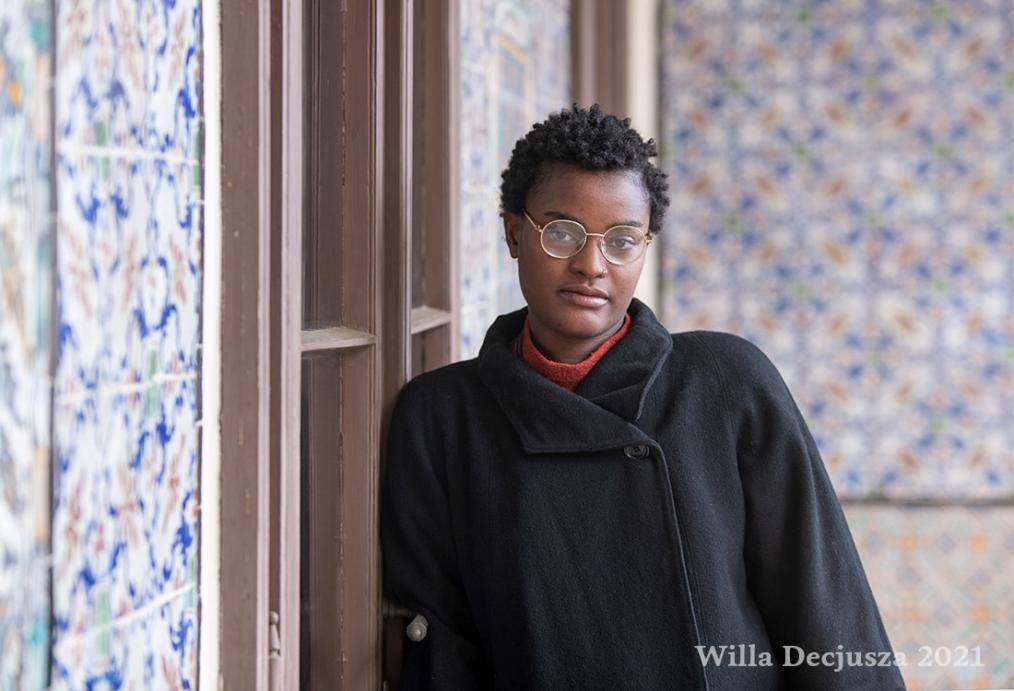Aaiún Nin
The resident of the International Cities of Refuge Network ICORN for the years 2021-2023.

Aaiún Nin is a poet, mixed media artist and activist from Angola. In her work she addresses the issues of race and sex discrimination, as well as LGBT+ experience. In 2016 she moved do Denmark, where she has worked in collaboration with artists identifying with queer culture (an artistic and political movement oriented towards empowerment and emancipation of non-heteronormative poeple). She has performed her poetry during numerous events, e.g. during Oslo Internasjonale Poesifestival in 2020. She has also appeared in a documentary film ‘Women of Water’, directed by Patricia Bbaale Bandak in 2017.
Her poetry draws upon the experience of childhood and youth spent in a traditional, patriarchal community and is strongly rooted in the context of postcolonial Africa. In her poems she often refers to the present situation in Angola, addressing problems of sexual violence inflicted on women, religious fundamentalism and the contradictions of Catholic doctrine, social inequalities and racism. Living in Copenhagen Aaiún Nin has also spoken of legal discrimination of immigrants and police violence in Scandinavian countries, and, sympathising with Black Lives Matter movement, she has stressed the need to rethink the hidden racial inequalities and defended the rights of black poeople. Her articles and poems have been published in ‘Friktion Magasin’, ‘Kritiker’ and ‘Klimaaksjonen’ (Norwiegian Writers’ Climate Campaign – NWCC).
Although the legislation criminalizing same-sex relations in Angola was overturned and new penal code was supposed to counteract discrimination and hate speech, the homophobic attitude rooted in traditional mentality didn’t disappear. LGBT+ people continue to face discrimination in employment, education, housing, and healthcare. Same-sex marriages are illegal, and sexual orientation is still considered taboo, to a large extent as a result of a strong position of Catholic church and the influence it has on common moral judgements. All this means that non-heterosexual people are victims of hate crimes and homophobic attacks, including rape, beatings and police brutality. And for Aaiún Nin, who openly explores homosexual experience in her work, it makes returning to her home country a considerable risk. This is why, after her residence in Denmark has expired, she has decided to embark on a scholarship opportunity in Krakow, where she is going to spend the next two years.
Her poetry draws upon the experience of childhood and youth spent in a traditional, patriarchal community and is strongly rooted in the context of postcolonial Africa. In her poems she often refers to the present situation in Angola, addressing problems of sexual violence inflicted on women, religious fundamentalism and the contradictions of Catholic doctrine, social inequalities and racism. Living in Copenhagen Aaiún Nin has also spoken of legal discrimination of immigrants and police violence in Scandinavian countries, and, sympathising with Black Lives Matter movement, she has stressed the need to rethink the hidden racial inequalities and defended the rights of black poeople. Her articles and poems have been published in ‘Friktion Magasin’, ‘Kritiker’ and ‘Klimaaksjonen’ (Norwiegian Writers’ Climate Campaign – NWCC).
Although the legislation criminalizing same-sex relations in Angola was overturned and new penal code was supposed to counteract discrimination and hate speech, the homophobic attitude rooted in traditional mentality didn’t disappear. LGBT+ people continue to face discrimination in employment, education, housing, and healthcare. Same-sex marriages are illegal, and sexual orientation is still considered taboo, to a large extent as a result of a strong position of Catholic church and the influence it has on common moral judgements. All this means that non-heterosexual people are victims of hate crimes and homophobic attacks, including rape, beatings and police brutality. And for Aaiún Nin, who openly explores homosexual experience in her work, it makes returning to her home country a considerable risk. This is why, after her residence in Denmark has expired, she has decided to embark on a scholarship opportunity in Krakow, where she is going to spend the next two years.

